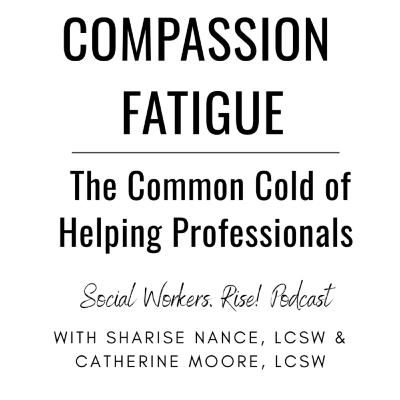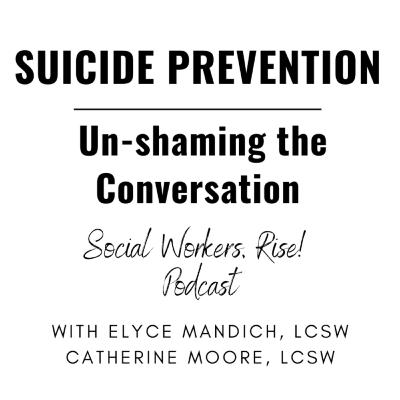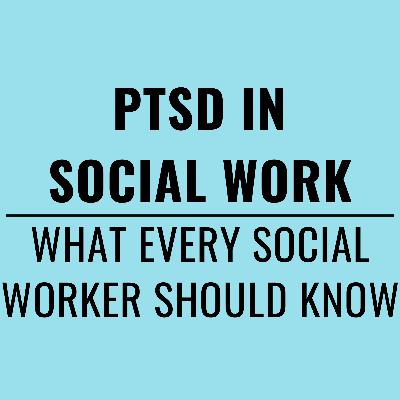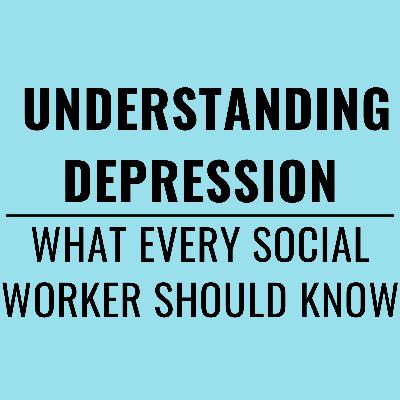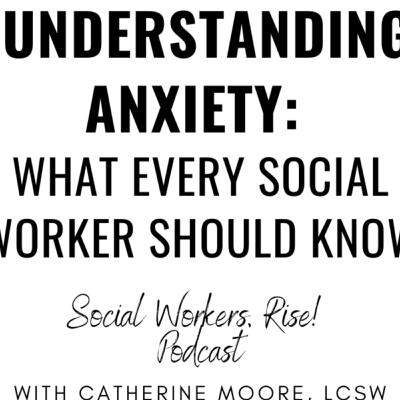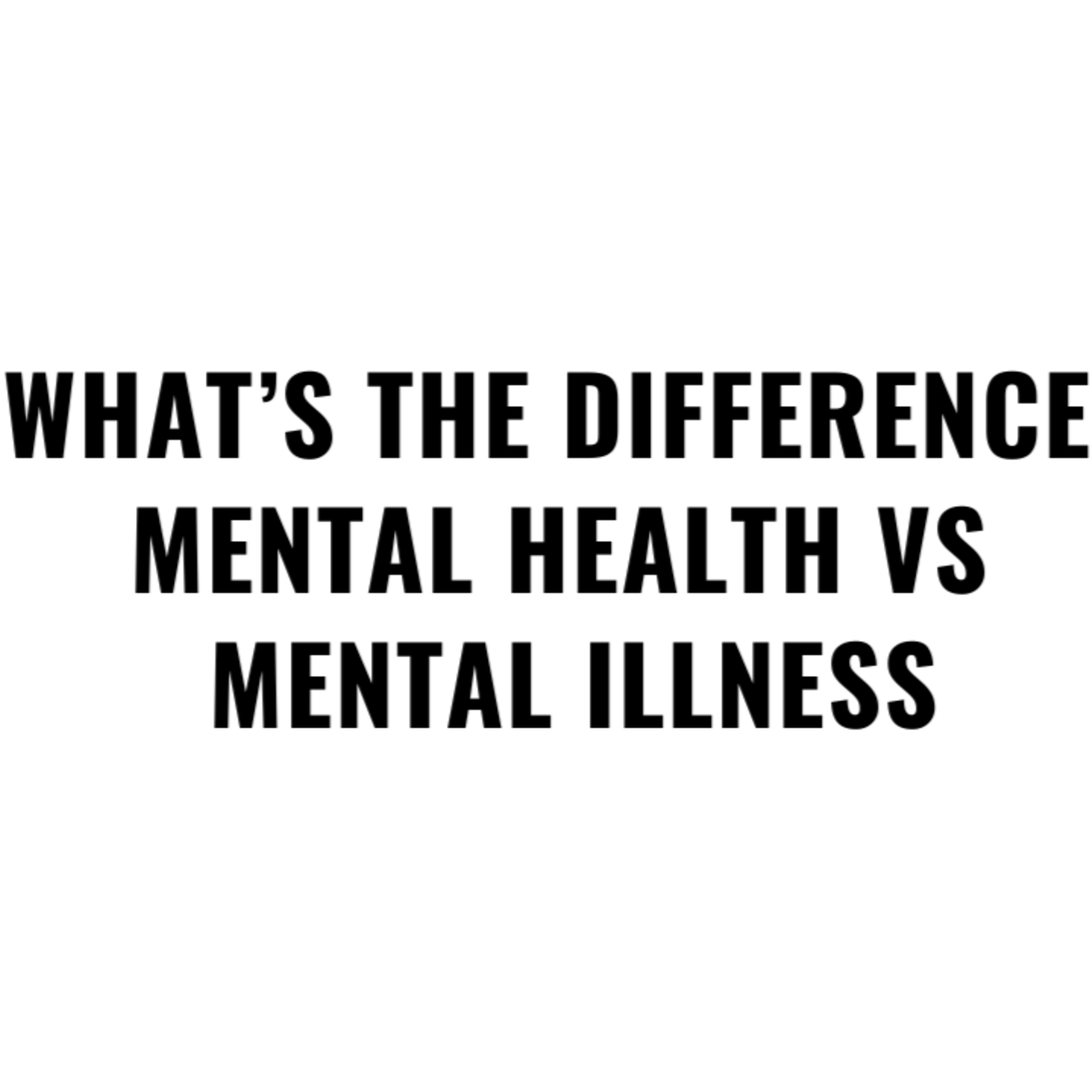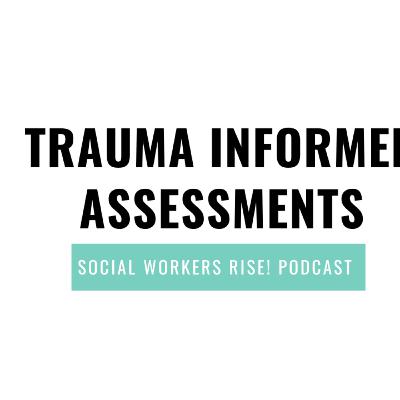Discover Social Workers, Rise!
Social Workers, Rise!

Social Workers, Rise!
Author: Catherine Moore, LCSW
Subscribed: 81Played: 1,627Subscribe
Share
© Catherine Moore, LCSW
Description
We will talk everything social work, on every level from micro to macro. We will hear the stories of social workers who are doing big things, learn new skills, and most importantly, give you actionable steps to change more lives than you ever thought possible.
211 Episodes
Reverse
In this episode, host Catherine Moore, LCSW, breaks down what it means to be a Palliative Care Social Worker — a role focused on enhancing quality of life for patients with serious or life-limiting illnesses.You’ll learn how palliative social workers support the emotional, social, and spiritual needs of patients and families through psychosocial assessments, family meetings, and advance care planning — all while collaborating with nurses, physicians, and chaplains as part of an interdisciplinary team.Catherine explains salaries, how to get started, the difference between hospice and palliative care (hint: palliative care isn’t just for end-of-life) and explores the key skills you’ll need, including:- Communication & compassion in difficult conversations- Grief counseling, trauma-informed care, and crisis intervention- Navigating family conflict with cultural humility- Self-awareness, emotional boundaries, and self-care to prevent compassion fatigueWhether you’re a new MSW graduate exploring career paths or simply curious about medical social work, this episode offers a clear, compassionate look into palliative care and the heart of this meaningful field.____________________________________Tap Here to Subscribe to the Social Workers, Rise! Email Resource ListTap Here to shop career courses for Social Workers.____________________________________Thank you to our SPONSORSHPSO Professional liability insurance designed for healthcare providersRISE Directory for Clinical Supervision
In this episode, host Catherine Moore, LCSW, shares her personal journey as a hospice social worker, including the story of her first hospice patient and the lessons she learned supporting individuals and families through the final stages of life.You’ll discover what hospice social workers really do—from grief counseling, crisis intervention, and family mediation, to navigating ethical dilemmas like the Right to Die and End of Life Option Act. Catherine also discusses self-care, spiritual experiences, salaries, and the deep emotional impact of this work.Whether you’re a new MSW graduate or exploring social work career options, this episode offers a heartfelt, realistic look into hospice care, advocacy, and what it means to provide dignity at the end of life.*Trigger Warning: Discussion of death, dying, and ethical dilemmas.Tap Here to Subscribe to the Social Workers, Rise! Email Resource ListTap Here to shop career courses for Social Workers.____________________________________Thank you to our SPONSORSHPSO Professional liability insurance designed for healthcare providersRISE Directory for Clinical Supervision
In this episode, I sit down with fitness coach Anthony Briseno to talk about how movement can truly transform your mental health. Whether you’re a social worker, therapist, or just someone trying to balance a busy life, this conversation will give you practical ways to understand the emotional benefits of exercise, make time for movement, and use fitness as a tool to manage stress.Anthony opens up about his journey from the business world to becoming a fitness coach, and how that shift helped him recover from burnout and anxiety. We dive into the connection between physical and emotional health—and how even small, consistent movement can help you feel calmer, more focused, and more resilient.Connect with Anthony here: Email: DJImic86@Yahoo.comIG FitBodyBootCampLeagueCityTexasWhat You’ll Learn:How exercise helps reduce stress, anxiety, and burnoutSimple ways to move your body throughout the dayTime-saving fitness tips for busy professionalsHow to start a sustainable fitness routine and The mental and emotional benefits of consistent movementAbout the Host:Catherine Moore, LCSW, is a mental health therapist, keynote speaker, and host of the Social Workers, Rise! Podcast. She helps social workers and helping professionals manage stress, prevent burnout, and find purpose in their work.____________________________________Tap Here to Subscribe to the Social Workers, Rise! Email Resource ListTap Here to shop career courses for Social Workers.____________________________________Thank you to our SPONSORSHPSO Professional liability insurance designed for healthcare providersRISE Directory for Clinical Supervision
Compassion fatigue — it’s called the “common cold” of helping professionals for a reason. In this episode, we dive into the signs and symptoms every social worker should recognize, from emotional exhaustion to the subtle ways it sneaks into daily life. You’ll hear real stories, strategies for breaking generational patterns of overgiving, and why self-awareness is essential for long-term sustainability in this field. Plus, we celebrate the incredible work of social workers through the SWAG Awards, highlighting those who go above and beyond. Whether you’re new or seasoned, this episode offers both validation and practical tools to thrive.Sharise Nance is a seasoned Licensed Clinical Social Worker, Trauma Specialist, Award-Winning author, Global Speaker, and Entrepreneur with over 25 years of experience. She co-founded HandinHand Counseling Services to address mental health disparities in Black communities and systemic pay gaps in the field. Known as the “Compassion Fatigue Lady,” Sharise is a pioneer in combating Compassion Fatigue and Leadership Burnout in Western PA.Join the Social Worker's Rise! Email List for more resources, courses, updates, and discounts.
Why is the word suicide still treated like it’s unspeakable? In this episode, Suicide Prevention: Un-shaming the Conversation, we’re breaking the silence and leaning into the tough talk every social worker needs. You’ll hear powerful insights from my guest, who trains others to see that saying the word is not dangerous—it’s necessary. Together, we unpack how open conversations can actually prevent suicide, reduce stigma, and save lives. If you’re a new, seasoned, or future social worker looking to boost confidence in tough client conversations, this episode is equal parts real, educational, and inspiring.Elyce Mandich is a mom, wife, girl's girl, relatable human, and a Licensed Clinical Social Worker in Southern California. She is the owner of The Therapy Co., a private practice that provides therapy services to women in California and the creator of "big empathy energy®" merchandise. For Elyce, her why in becoming a therapist is connected to and inspired by personal experience when she lost her mom to suicide at 10-years-old. She believes in cultivating a strong sense of belonging and empathy - both for ourselves and for others. Elyce is passionate about suicide prevention and helping other mental health profesionals with getting comfortable having the hard conversations through her trainings on suicide. Resources from this episode:Suicide is Not a Bad Word Training (Recorded from September 2024, Use code RISE10 for $10 off)Empathy Merch (Use coe BELONG10 for 10% off) Elyce / The Therapy Co on InstagramA Kid's Book About Suicide (Book)Clinical Supervision Log The Rising Clinician on AmazonJoin the Social Worker's Rise! Email list here for tips, tools, courses for social workers, and more!
What happens when social work meets the world of sports? In this episode, we sit down with the leaders of the Alliance of Social Workers in Sports to explore this fast-growing specialty. From youth leagues to professional teams, sport social workers are stepping in to address mental health issues like OCD, perfectionism, eating disorders, and anxiety—challenges often hidden behind performance pressure. You’ll discover the unique settings they work in, how they support athletes both on and off the field, and why this niche is opening new career paths for social workers. Curious? This episode might just inspire your next move.Christine Mosher is a Licensed Independent Clinical Social Worker and Psychotherapist in private practice in Massachusetts. She is a member of the Massachusetts Chapter of the NASW, and a Board Member of the Alliance of Social Workers in Sports, where she also serves as the Co-Chair of the Clinicians Committee. Christine specializes in athlete mental health, and sees clients ages 10 and up, adolescents, young adults, and adults. Christine is also the Co-Founder of AthleteWellness Consultants, a consulting group that provides education and training to athletes, coaches and teams of all ages and levels about athlete mental health and wellness. AWC strives to help athletes to thrive on and off the field, promote effective communication around athlete mental health, and create a more positive and affirming sport culture. Connect here: cmosher2364@gmail.comJessica Joiner is a therapist and the founder of her own practice, bringing expertise and passion to the intersection of mental health and athletics. She is EMDR-trained and serves as Co-Chair of the Clinicians Committee for the Alliance of Social Workers in Sports, where she helps shape the future of this growing specialty. In addition, Jessica is an Approved Drug and Alcohol Evaluator with the Department of Transportation. Her work blends clinical skill with advocacy, supporting both athletes and everyday clients in overcoming challenges and achieving lasting growth. Connect here: jessica.joiner@journeyinspiredcounseling.comResources from this episode11th Annual Social Work in Sports Symposium Alliance of Social Workers in SportsAthlete Wellness ConsultantsJoin the Social Worker's Rise! Email List for more resources, courses, updates, and discounts.
Are you a social worker looking to build financial freedom beyond the 9-5? 💸 In this inspiring episode of Social Workers, Rise! Catherine Moore, LCSW, chats with Bas Moreno—Financial social worker, podcaster, Zumba instructor, author, and speaker—about how he’s successfully built multiple streams of income while staying true to his mission of service.You’ll discover:- How to maximize your skills to generate income outside of your day job- The power of becoming an author, speaker, and content creator- How podcasting opened doors to networking and visibility- Why Bas added “Zumba instructor” to his income mix- Pro tips for using LinkedIn and Instagram to network- Why financial coaching is essential for every family—and how Bas teaches itWhether you're just starting out or ready to expand your impact (and income), this episode is packed with actionable insights and real-life strategies to help you think big and earn bigger—without burning out.👉 Tune in now and learn how to diversify your income with purpose!
Have you ever wondered what PTSD really looks like from the inside out? In this raw and powerful solo episode of Social Workers, Rise!, host Catherine Moore, LCSW, opens up about her personal journey with Post-Traumatic Stress Disorder (PTSD) after losing her home in a devastating wildfire at just 16 years old.Through her lived experience and clinical lens, Catherine explores:🔥 The emotional aftermath of surviving a natural disaster🧠 What PTSD really is—plus how it's different from acute stress reactions and complex PTSD😔 Why not everyone develops PTSD from the same traumatic event👀 How symptoms like flashbacks, panic attacks, and avoidance can show up⚡ The critical difference between empathy and unhelpful comparisons💡 Effective trauma treatment options including EMDR, TF-CBT, mindfulness, and more🎯 Why social workers, women, BIPOC, and helping professionals are at higher risk for PTSDWhether you're a social worker, student, or survivor, this episode will deepen your understanding of trauma and provide insight into how to support yourself and others with compassion.✨ Bonus: Catherine shares a powerful resource to help new and emerging clinical social workers feel more confident in their skills—her Clinical Essentials for the Future Therapist course.🎧 Press play to learn, reflect, and rise with us.____________________________________Tap Here to Subscribe to the Social Workers, Rise! Email Resource ListTap Here to shop career courses for Social Workers.____________________________________Thank you to our SPONSORSRISE Directory for Clinical Supervision
Depression is one of the most common mental health conditions, and as a social worker, understanding how to support clients with depression is vital. This episode of Social Workers, Rise! explores everything new social workers need to know about depression, including key symptoms, risk factors, treatment options, and how to recognize it in clients (and ourselves).From emotional and physical symptoms to evidence-based therapeutic interventions, you’ll learn how to address depression through a holistic and trauma-informed lens.🧠 In This Episode, You’ll Learn:What depression is and what it isn’tPrevalence rates and who is most at riskCommon symptoms of depressionEffective treatment options and when to referHow social workers can support clients with depression🎧 Listen now and share with fellow social workers!____________________________________Tap Here to Subscribe to the Social Workers, Rise! Email Resource ListTap Here to shop career courses for Social Workers.____________________________________Thank you to our SPONSORSRISE Directory for Clinical Supervision
Anxiety is one of the most common mental health conditions in the world—and as new social workers, it’s essential to understand how to recognize it, support clients dealing with it, and manage it in ourselves.In this episode of Social Workers, Rise!, host Catherine Moore, LCSW, breaks down everything you need to know about anxiety from a clinical and practical lens. Whether you’re in supervision, just graduated with your MSW, or supporting high-risk populations, this episode is for you.🧠 In This Episode, You’ll Learn:What anxiety is—and what it isn’tPrevalence stats you should know as a clinicianWho is most at risk for anxiety disordersCommon emotional, physical, and behavioral symptomsEffective treatment options (including therapy, medication, and holistic supports)Whether you’re in a hospital, school, or private practice setting, this episode gives you real-world tools to improve your skills as a trauma-informed social worker.🎧 Hit play and feel more prepared to work with clients experiencing anxiety.____________________________________Tap Here to Subscribe to the Social Workers, Rise! Email Resource ListTap Here to shop career courses for Social Workers.____________________________________Thank you to our SPONSORSRISE Directory for Clinical Supervision
What’s the difference between mental health and mental illness? As new social workers, understanding this distinction is crucial—not just for our clients, but for our own well-being as we step into emotionally demanding roles.In this episode of Social Workers, Rise! Podcast, host Catherine Moore, LCSW, breaks down the definition of mental health vs. mental illness, shares current mental health statistics, and explores which populations are at the highest risk. You'll also learn how to recognize signs of a mental health problem, both in your clients and yourself, and explore evidence-based treatment options.Whether you’re in clinical supervision, preparing for licensure, or starting your first job after earning your MSW, this episode will help you build a strong foundation in mental health literacy.💬 In This Episode, You’ll Learn:-The key difference between mental health and mental illness-Mental health prevalence rates you need to know-High-risk populations every social worker should understand-Common symptoms of mental health concerns-Treatment options and how social workers play a vital role in access and advocacy. ✨ Subscribe, rate, and share with a fellow social worker!📲 Connect on Instagram @socialworkersrise____________________________________Tap Here to Subscribe to the Social Workers, Rise! Email Resource ListTap Here to shop career courses for Social Workers.____________________________________Thank you to our SPONSORS
In this episode of Social Workers Rise, we’re diving into a topic that every social worker needs in their toolbox: Trauma-Informed Assessments.You’ll walk away with a deeper understanding of what trauma is and how it impacts the people we serve. We’ll break down the psychosocial assessment step-by-step and explore how to apply trauma-informed principles to make the process safer, more compassionate, and more effective for clients. Whether you’re a student, new in the field, or a seasoned professional, this episode will help you sharpen your assessment skills and enhance your practice.I’ll also be sharing some go-to resources you can use right away to support your trauma-informed work. Tune in and let’s grow together!Want more? Tap Here to Subscribe to the Social Workers, Rise! Email Resource ListTap Here to shop career courses for Social Workers.____________________________________Thank you to our SPONSORS
The Social Work Interstate Compact is being promoted as a solution to licensure mobility, but is it right for YOU?In this episode of Social Worker’s Rise!, we take a critical look at the compact and discuss its potential downsides. From concerns about ethical liability and accessibility to its impact on professional standards, we break down what social workers need to know before supporting this initiative.In This Episode, We Discuss:✔️ What the Social Work Interstate Compact is and how it works✔️ The biggest concerns and challenges social workers may faceAbout our guest:Lequita Brooks, LCSW, MSW is the Owner of The Social Work Incubator®️ and Author of the Social Work Career Mapping©️ curriculum. She uses her voice and love for writing editorials, blog posts, and social media content to bring awareness to social work licensing standards, career mapping for social work students, and income diversification for therapists. Lequita’s mantra is you can make money and make a difference.Links from the show:The Social Work Incubator®️LinkedIn_______________________________________Thanks to our sponsor,RISE DirectoryWant more Social Work resources?Join the SW Rise email list.
Getting supervision at your work is just 1 way to find a clinical supervisor but this may not be the best for everyone; you do have other options.
Social Workers who are in the supervision process or are about to start the supervision process you will NEED to hear this episode. Supervision is a huge investment in your career, you need to be sure you have the best resources available to you, including your supervisor.
Thank you to our podcast sponsor, RISE Directory. Find a Clinical Supervisor near you today www.RISEDirectory.com
In this episode, Catherine Moore, LCSW discusses the impact of social media on mental health, focusing on warning signs to look out for in oneself and clients. She categorizes these signs into behavioral, emotional, and social aspects, providing insights into how social media can affect self-esteem, relationships, and overall well-being. Catherine also offers actionable tips for managing social media use, emphasizing the importance of setting intentions, boundaries, and taking breaks.
Chapters
00:00 Introduction to Social Media's Impact on Mental Health
03:24 Behavioral Warning Signs of Social Media Use
07:43 Emotional Warning Signs of Social Media Use
10:08 Social Warning Signs of Social Media Use
15:53 Actionable Advice for Managing Social Media Use
To stay up to date on career development resources for social workers, join the email resource list here.
In this episode, Catherine discusses the top five high-paying careers in social work, emphasizing the importance of specialized skills, advanced degrees, and strategic career choices to maximize earning potential. She provides insights into various roles, including medical social work, clinical social work, corporate social work, school social work, and travel social work, along with tips for enhancing career prospects and salary.
____________________________________
Tap Here to Subscribe to the Social Workers, Rise! Email Resource List
Tap Here to shop career courses for Social Workers.
____________________________________
In this episode of Social Workers Rise, host Catherine, LCSW discusses the top 10 social work trends for 2024, emphasizing the importance of staying ahead in the field. The conversation covers the integration of technology, trauma-informed practices, the demand for geriatric social work, and the focus on diversity, equity, and inclusion. Catherine also highlights the significance of workforce well-being, hybrid work models, and the ongoing advocacy for social work licensing reform. The episode concludes with actionable recommendations for social workers to enhance their careers and adapt to these trends.
____________________________________
Tap Here to Subscribe to the Social Workers, Rise! Email Resource List
Tap Here to shop career courses for Social Workers.
____________________________________
In this episode of Social Workers RISE!, I sit down with Matt Schaefer to discuss the Social Work Interstate Compact—a game-changer for licensure portability across participating states. We break down how the compact works, its current status, and what advocacy efforts are needed to bring more states on board.
We also dive into the potential impact on mental health care access, telepractice, travel social work, and disaster response. Most importantly, we emphasize how vital it is for social workers to share their experiences and drive the legislative changes that will shape our profession's future.
Learn more at the Social Work Compact’s website https://swcompact.org/
Matt Shafer currently serves as the Deputy Director at the National Center for Interstate Compacts at The Council of State Governments. Matt works with state legislators and stakeholder groups to support the enactment of compacts for teaching, cosmetology, massage therapy, social work, dietitians, and dentistry. Matt has vast experience developing and building consensus on policy options for state legislators.
Matt has a master’s degree in public policy from the University of Kentucky.
____________________________________
Tap Here to Subscribe to the Social Workers, Rise! Email Resource List
Tap Here to shop career courses for Social Workers.
____________________________________
Thank you to our SPONSORS
CHEP for Continuing Education
Therapist Development Center (TDC) Homepage
TDC Continuing Education Courses
On The Edge of Life: An Introduction to Treating Suicidality
Use the code SWRISE10 at checkout to receive 10% off
In this episode of Social Workers RISE! Podcast, I explore the intricate world of hospital social work, covering the diverse roles and responsibilities that social workers hold in medical settings. I dive into the unique challenges faced in intensive care units, discuss the critical ethical considerations in end-of-life care, and share some of the complexities of working in the birthing unit.
I also highlight the importance of cultural sensitivity and provide practical tips for aspiring hospital social workers on building essential skills and standing out in this competitive field.
Takeaways
Hospital social work is highly sought after and competitive.
Experience in medical settings can help secure hospital positions.
Social workers in hospitals deal with high-stress, complex cases.
Collaboration with interdisciplinary teams is crucial in hospitals.
Crisis intervention skills are essential for hospital social workers.
End-of-life care discussions require sensitivity and ethical awareness.
Cultural competence is vital in diverse hospital environments.
Documentation and assessment skills are critical for success.
Networking and building relationships can open job opportunities.
Continuous learning and training are important for professional growth.
For an in-depth virtual seminar, register here and use code RISE for a discount. https://chep.member365.org/public/event/details/5d951f833529f3747bc3580e0f8c6e370d828fbf/1
____________________________________
Tap Here to Subscribe to the Social Workers, Rise! Email Resource List
Tap Here to shop career courses for Social Workers.
____________________________________
Thank you to our SPONSORS
CHEP for Continuing Education
Therapist Development Center (TDC) Homepage
TDC Continuing Education Courses
On The Edge of Life: An Introduction to Treating Suicidality
Use the code SWRISE10 at checkout to receive 10% off
In this episode, I dive into the pervasive issue of burnout among social workers, sharing my personal experiences and insights. I talk about the symptoms of burnout, how it impacts both professional and personal life, and offer some strategies for managing and preventing it.
I emphasize the importance of self-care, setting boundaries, and seeking support from colleagues and supervisors. My hope with this episode is to raise awareness about burnout and encourage social workers to prioritize their well-being.
Takeaways
60 to 80% of social workers report experiencing burnout.
Burnout can lead to emotional exhaustion and reduced sense of accomplishment.
It's crucial to recognize the symptoms of burnout early.
Burnout affects not only work but also personal relationships.
Setting boundaries is essential for maintaining work-life balance.
Self-care should be enjoyable and not feel like a chore.
Social support is vital in managing stress and burnout.
Supervisors can provide support and help lighten workloads.
Identifying personal values can guide better time management.
Many social workers are unaware of their burnout until it escalates.
For an in-depth virtual seminar, register here and use code RISE for a discount. https://chep.member365.org/public/event/details/5d951f833529f3747bc3580e0f8c6e370d828fbf/1
____________________________________
Tap Here to Subscribe to the Social Workers, Rise! Email Resource List
Tap Here to shop career courses for Social Workers.
____________________________________
Thank you to our SPONSORS
CHEP for Continuing Education
Therapist Development Center (TDC) Homepage
TDC Continuing Education Courses
On The Edge of Life: An Introduction to Treating Suicidality
Use the code SWRISE10 at checkout to receive 10% off



